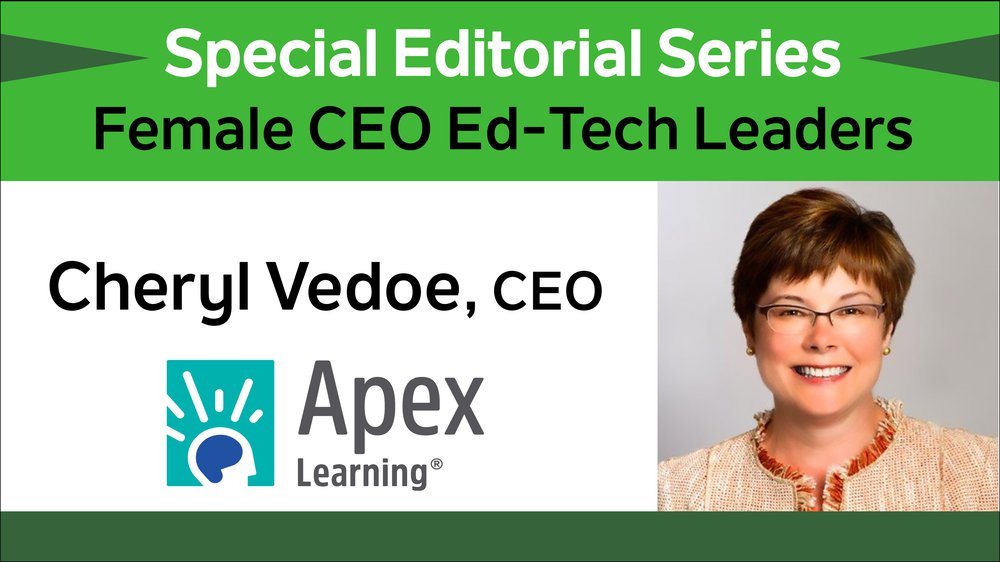Meeting with Apex Learning CEO Cheryl Vedoe defined how creating the company's viable strategy is the utmost function in determining the success of an educational company. It is a strategy that requires implementing the company’s best practices that uniformly deliver educational technology services to school districts, teachers, and students.
"One of the biggest pitfalls is that you become so focused on the details and the urgent things that need to be done that you lose sight of that bigger picture. It can lead to inefficiencies and ineffective implementation.” explained Vedoe.
She expressed how fortunate they are to have investors who share their passion for making a difference in education. “While there are people who think the notion of corporate ROI is incompatible with serving education, I don’t see it that way. It is because we are able to sustain a growing, profitable business that we are able to continue to make a difference in education. To us, sustaining a growing, profitable business means maintaining our focus on solving problems that are priorities for educators and for which there is a budget. It means always listening to and learning from our users; it’s from them we understand where it makes sense to focus next.”
Vedoe goes on to say, “We don't think of ourselves as an education technology company. We think of ourselves as an education company, we always have. It's just that our focus is taking advantage of technology to help educators solve very real problems.”
Educational technology has the potential to make a difference. Vedoe pointed out it’s not enough to simply provide teachers with access to the digital curriculum. “Successful digital curriculum implementations require clear goals and objectives, an implementation plan built on best practices, professional development for teachers and administrators, ongoing monitoring and support, and periodic evaluation and optimization. Our team of implementation success managers works closely with our clients to ensure implementation success.”
Implementation success managers play a huge roll in the company’s strategy. They are a professional services team. And they are the ones who engage with the school district and implement a program that helps the district. “Our focus is a digital curriculum for grades 6–12 that empowers educators to personalize learning to meet diverse student needs. Our solutions address the spectrum—from students struggling with one grade level content to those capable of accelerating their learning,” adds Vedoe.
For twenty years, Apex Learning has brought solutions to educational needs. Their curriculum on “Learn by Doing” uses a variety of blended learning models in order to combat boredom in schools. The curriculum engages students in lessons that include multiple opportunities to explore, apply, practice, and confirm their understanding. Apex stays away from the basic video instruction model. They use video instruction but take full advantage of what technology can do to create a really interactive learning experience.
“If you're in a lesson in our digital curriculum, you'll read a little, and then you'll have an interactive that will ask you to do something to basically confirm that you understood what you just read or apply what you just learned in another situation,” clarified Vedoe.
Their curriculum uses active learning because a lot of the students they serve are struggling and are traditionally lower performing students. The classroom model wasn't successful for them; A model with the teacher delivering instruction and students reading a textbook at night, the teacher delivering that instruction in the class period, and then an assessment. “We've always felt that these students who aren't successful in that model with a live teacher in the classroom are less likely to be successful when it's a video that they have to pay attention to and there's not even a live person to engage them. So we really have tried to create a very active learning experience to actually draw these students and engage them and they are learning,” adds Vedoe.
Apex also provides online Advanced Placement courses in a virtual model with Apex teachers to school districts across the country. “That met a real need that schools have. About 40% of high schools don't offer an onsite Advanced Placement program because they don't have qualified teachers,” explained Vedoe. “Or, if they do, they don't have enough students to make it feasible to do that. So, we don't look at this as a technology for the sake of technology.”
As we wrapped up our meeting, I asked Vedoe what it was like working for Apple. I was surprised to find out that Apple introduced her to educational technology. She moved from software engineering into the product management and higher level general management. Because of the set of circumstances, she was asked to run the K through 12 education business. “I would say, to be perfectly honest, that was a real turning point in my career. It was a surprising thing to have happen. But, I really enjoyed getting into the K - 12 space.”
Apple has always had one of the strongest teams in terms of K - 12 education. “I learned an immense amount about the potential for technology and education from the people I worked with at Apple and it was really a great experience,” expressed Vedoe.










